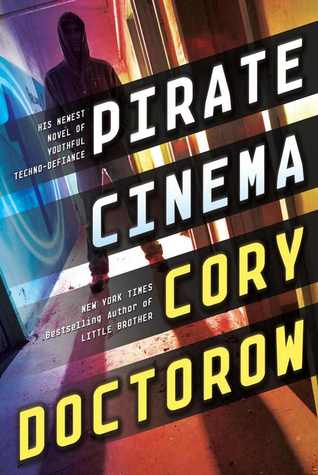I Just Read Pirate Cinema
February 09, 2013 at 08:53 PM | categories: books | View Comments
Some brief thoughts on Cory Doctorow's Pirate Cinema: It's not great. In a nutshell, it's about a 16-year-old who runs afoul of the law for downloading and remixing too many movies. He runs away from home and falls in with a gang of kind-hearted squatters, whom he recruits in his fight against "the man" to change copyright laws.
The book is a very transparent attempt to make the author's views on copyright entertaining in a young-adult-friendly package. Unfortunately, it fails as both a political screed and an adventure story.
As a story, it's filled with characters who are shallow by necessity to make the political statements as forcefully as possible. All of the runaways are well-adjusted, good natured kids who for some reason all have very strong views on copyright law, and all of them sympathetic to the author's views. Despite being a 16-year-old runaway, the protagonist never faces any obstacles at all aside from those directly related to his various counts of copyright infringement. Hunger is never an issue, because his new friends teach him ways to get free food. Exposure is never an issue, because his friends teach him the ways of the squatter. Loneliness is never an issue, because he meets lifelong friends his first night in London. There is one sequence where drugs look like they may become an issue, but Doctorow never pulls the trigger on showing any real danger associated with being a child runaway. There's not really even any antagonist at all, aside from a law the protagonist is trying to prevent from getting passed (possibly because Doctorow was afraid to put any face at all on the enemy, lest the reader find any sympathy at all for Big Copyright).
As a political screed, it fails as well, and this is coming from someone very sympathetic to Doctorow's views. Through the whole book, I found myself thinking that--contrasted with the suspiciously absent problems of homelessness--bad copyright laws are really a first-world problem. The book is obviously intended for a younger audience, so pulling some punches might be expected, although making running away the best thing that ever happened to the protagonist might not be a good message to send to young readers. Even discounting that, the political discussion is just a bunch of straw men Doctorow knocks down. All infringement done by the protagonist is in the name of art, and the only time copyright infringement to get free stuff is discussed, it is hand-waved as being ok because the movies Hollywood makes are rubbish anyway. Without a character surrogate for Big Copyright voicing any legitimate objections to Doctorow's views in the book, he never really challenged himself and I found myself siding with the copyright law if only because the book actually makes it seem like the underdog.
Finally, the book takes some weird digressions on current, real-world technology. This may be an artifact of the techno-thriller genre that I just have to endure, though. There are several pages discussing how easy it is to install Linux, and later on there are several pages discussing various features of TrueCrypt. There's a discussion of recent advances in lasers used to kill mosquitos (oddly enough missing an opportunity to take a potshot at patent law, as the invention is tied closely to Nathan Myhrvold and Intellectual Ventures). If you are really cynical, there is even a discussion that could be construed as an argument that if only homeless people took to heart the lessons in Eric Ries The Lean Startup they could have the easy life. Neal Stephenson, another cyberpunk author, makes similar rambling discussions. While I don't particularly enjoy those either, I respect that they all seem very well researched and cover a wide range of subjects. The digressions in this book seem like Doctorow looked at his computer desktop and the most recent items in his RSS feed and decided to put those in the book.
Not recommended.